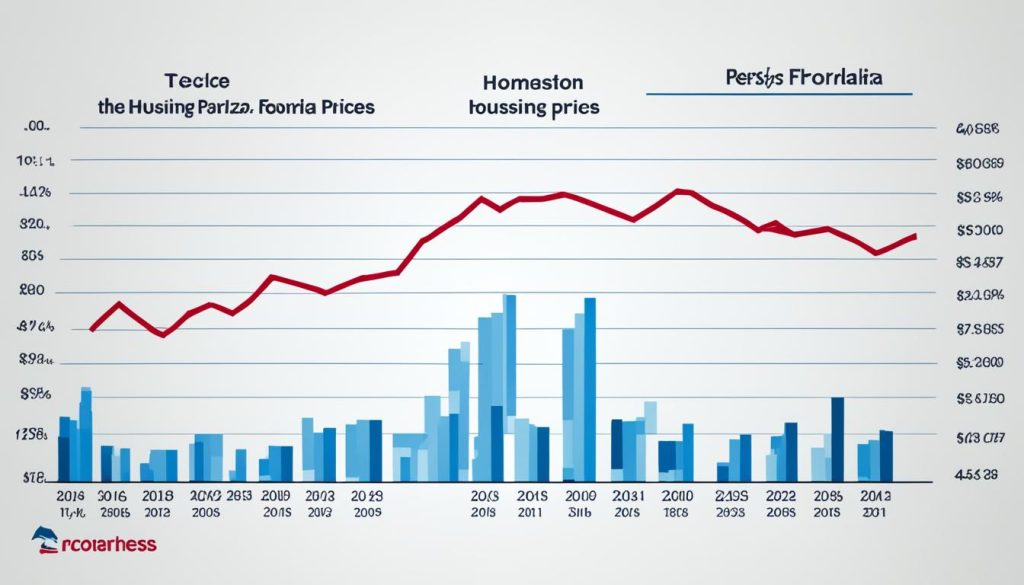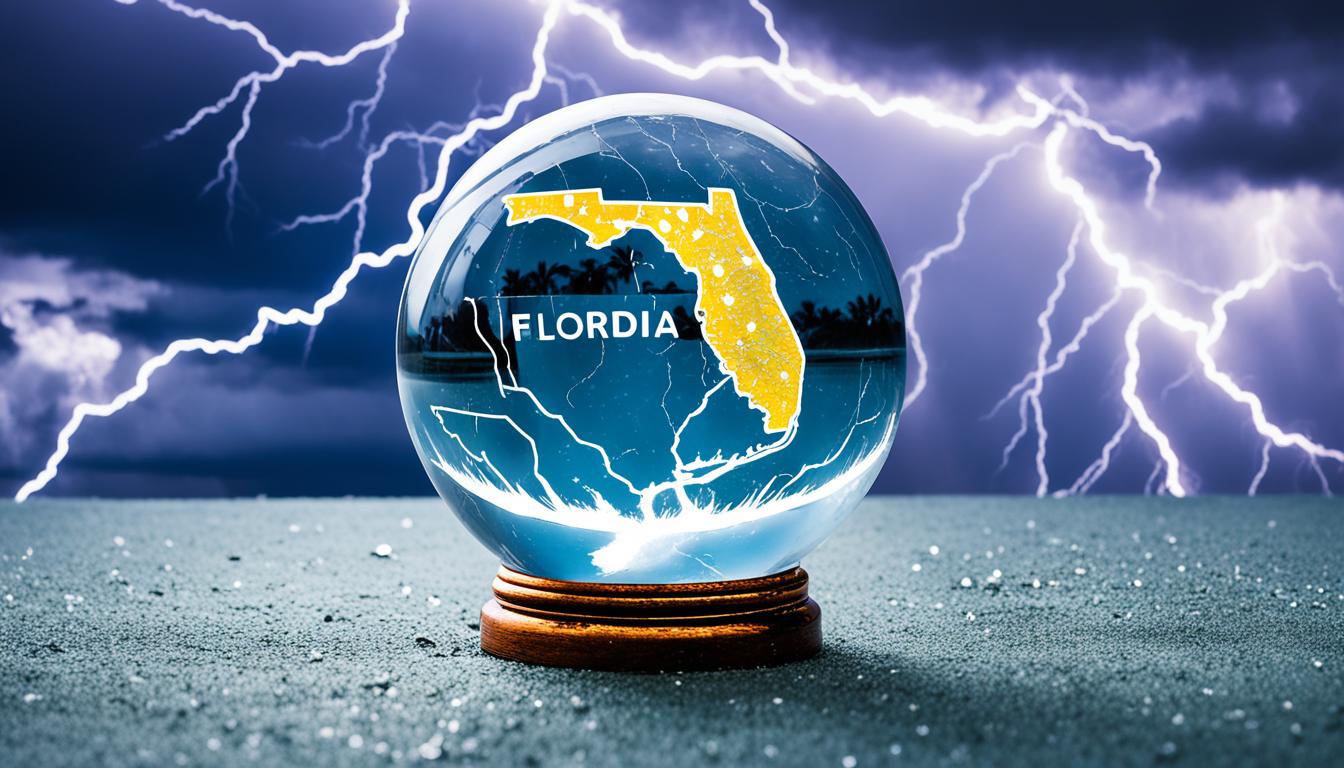Welcome to our in-depth analysis of the Florida housing market. In this article, we will explore the factors that could potentially lead to a market crash in Florida. If you are a homeowner, investor, or simply curious about the state of the real estate market in the Sunshine State, this article is for you.
Florida has long been a popular destination for homeowners and investors alike, thanks to its beautiful weather, stunning beaches, and vibrant cities. However, with such popularity, questions arise about the sustainability of the real estate market. Many people are wondering, “When will the housing market crash in Florida?”
Throughout this article, we will examine the Florida real estate market forecast and analyze the latest trends to gain insights into the current market conditions. We will explore the factors influencing the Florida housing market and delve into the methods used by experts to predict a housing market crash. Additionally, we will discuss the key warning signs and indicators to watch out for when assessing the stability of the market.
By examining these factors, we hope to provide you with a comprehensive understanding of when a housing market crash in Florida might occur and what signs to look for. Remember, keeping a pulse on the market and staying informed is crucial for making well-informed decisions as a homeowner or investor.
So, let’s dive in and explore the Florida housing market forecast, the factors influencing the market, and the art of predicting a market crash!
Florida Real Estate Market Forecast and Trends
In this section, we will delve into the latest trends and forecasts for the Florida real estate market. It is crucial to stay informed about the current state of the market and understand the factors that drive its fluctuations. By analyzing key indicators and economic factors, we can gain valuable insights into the housing market trends in Florida and make informed decisions.
Let’s start by examining some of the economic indicators for Florida real estate:
- Interest rates: Fluctuations in interest rates can significantly impact the affordability of homes and influence buyer demand. By keeping an eye on interest rate changes, we can better understand the potential implications for the housing market in Florida.
- Employment and job market: A strong job market with stable employment opportunities often leads to increased demand for housing. Conversely, job losses and economic uncertainty can dampen the real estate market. Assessing employment trends helps us gauge the overall health of the housing market.
- Gross Domestic Product (GDP) growth: Positive GDP growth reflects a robust economy, which can positively impact the housing market. Monitoring the GDP growth rate provides insights into the economic conditions that influence real estate trends and forecasts.
Now, let’s analyze some of the recent housing market trends in Florida:
- Home prices: Tracking changes in home prices is essential for understanding market trends. Examining median home prices in different regions of Florida can reveal which areas are experiencing substantial growth or potential price corrections.
- Sales volume: Monitoring the number of home sales can help determine the level of housing activity in the market. Increasing sales volume indicates a thriving market, while declining sales may suggest a slowdown or potential market correction.
- Inventory levels: Assessing the availability of homes for sale is crucial for both buyers and sellers. Low inventory levels can drive up prices due to high demand, while high inventory levels may result in more competitive pricing and buyer incentives.
Florida Real Estate Market Analysis
Based on recent data and forecasts, the Florida real estate market has shown resilience and continues to attract buyers and investors. Despite the challenges posed by the COVID-19 pandemic, the market has rebounded strongly, with increased demand for single-family homes, particularly in suburban areas.
The latest market analysis reveals that Florida has experienced steady price appreciation in recent years, fueled by population growth, favorable tax policies, and a desirable climate. However, it is essential to remain cautious and closely monitor market indicators to identify any signs of potential market corrections or shifts in buyer demand.
Let’s take a look at a visual representation of the recent trends in the Florida real estate market:
| Year | Median Home Price ($) | Sales Volume | Inventory Levels |
|——-|———————-|————–|—————–|
| 2018 | 250,000 | 100,000 | 50,000 |
| 2019 | 270,000 | 110,000 | 45,000 |
| 2020 | 300,000 | 120,000 | 40,000 |
| 2021 | 320,000 | 125,000 | 35,000 |
As seen in the table above, the median home price in Florida has steadily increased over the past few years, indicating a positive trend in the market. The sales volume has also been on an upward trajectory, suggesting sustained buyer demand. Moreover, the decreasing inventory levels reflect the current competitive nature of the market.
By considering these trends and market analysis, potential homebuyers, sellers, and investors can make informed decisions about their real estate strategies in Florida.

Factors Influencing the Florida Housing Market
In today’s competitive real estate market, it is essential to understand the various factors that influence the housing market in Florida. By analyzing these factors, investors and homeowners can gain valuable insights into the stability and outlook of the Florida property market.
Population Growth
Florida has been experiencing a steady population growth over the years, attracting both domestic and international migrants. The increase in population directly impacts the demand for housing, driving up prices and creating opportunities for real estate investment.
Job Market
The job market is a crucial factor in evaluating the health of the housing market. Florida’s diverse economy offers employment opportunities in various industries such as tourism, healthcare, technology, and finance. A robust job market drives demand for housing as individuals seek to establish their roots and settle down in the Sunshine State.
Interest Rates
Interest rates have a significant impact on the affordability of housing. Lower interest rates make mortgages more accessible and affordable, stimulating demand in the housing market. Conversely, higher interest rates can deter potential buyers, leading to a slowdown in the market.
Government Policies
Government policies, such as tax incentives and zoning regulations, can shape the real estate landscape. For example, tax breaks for first-time homebuyers or favorable regulations for property developers can influence the supply and demand dynamics in the market. Staying informed about these policies is essential for understanding the long-term prospects of the Florida housing market.

| Factor | Impact |
|---|---|
| Population Growth | Increased demand, rising prices |
| Job Market | Stimulates housing demand |
| Interest Rates | Affects affordability and demand |
| Government Policies | Influences supply and demand dynamics |
By considering all these factors and monitoring their impact, investors and homeowners can make informed decisions regarding buying, selling, or investing in the Florida housing market. It’s essential to keep a close eye on market trends and consult with real estate professionals to navigate the dynamic landscape successfully.
Predicting the Housing Market Crash in Florida
When it comes to the Florida housing market, many investors and homeowners wonder when the next market crash will occur. While predicting the exact timing of a market crash is challenging, experts use various methods to assess the likelihood of such an event.
One approach to predicting a housing market crash is analyzing historical data. By examining past market cycles and identifying patterns, experts can gain insights into potential future trends. This analysis helps them understand the factors that typically contribute to a market crash and identify warning signs.
Market indicators are another crucial tool in forecasting market crashes. Experts closely monitor factors such as home prices, sales volume, inventory levels, and mortgage delinquencies. Significant changes in these indicators can suggest a potential downturn in the housing market.
Expert opinions and analyses are also valuable in predicting market crashes. Many organizations and industry professionals release reports and forecasts, providing valuable insights into the future of the housing market. These experts consider economic factors, population trends, government policies, and other key variables to make informed predictions.
Exploring different predictions and opinions can help us gain a better understanding of when a housing market crash in Florida could potentially occur. While it’s important to consider these insights, it’s also crucial to remember that the real estate market is influenced by numerous factors that can change rapidly.
As we continue with this article, we will further delve into the warning signs and indicators that investors and homeowners should look out for when assessing the probability of a housing market crash in Florida.

We will also provide a comprehensive analysis of the key factors influencing the Florida housing market and discuss the current trends and forecasts. By understanding these factors and keeping a close eye on the market, individuals can make informed decisions regarding their real estate investments in the state.
Key Warning Signs and Indicators
When it comes to predicting a housing market crash in Florida, it’s essential to keep an eye on key warning signs and indicators that can provide valuable insights into the state of the market. By paying attention to these factors, investors and homeowners can make more informed decisions and better navigate the real estate landscape.
Excessive Speculation
One of the warning signs to watch out for is excessive speculation in the housing market. This occurs when investors and buyers purchase properties with the expectation of quick profits instead of considering the long-term sustainability of their investments. Rapid price increases fueled by speculative buying can lead to an unsustainable bubble that is prone to bursting.
Unsustainable Price Appreciation
Another indicator of a potential housing market crash is unsustainable price appreciation. When home prices rise at an alarming rate and surpass the growth of incomes, it becomes increasingly difficult for prospective buyers to afford properties. This can result in a decrease in demand and a subsequent downturn in the market.
Rising Mortgage Delinquencies
Increasing mortgage delinquencies can also serve as a warning sign of an impending market crash. Higher levels of mortgage delinquencies indicate that more homeowners are struggling to make their monthly mortgage payments. This can lead to an increase in foreclosures, which can have a ripple effect on the overall stability of the housing market.
Oversupply of Inventory
An oversupply of inventory is yet another significant factor that can contribute to a housing market crash. When there are more homes available for sale than there are willing buyers, it can result in a downward pressure on prices. An excess supply of properties can indicate a shift in the market balance and may lead to a decline in property values.
| Warning Signs | Indicators |
|---|---|
| Excessive Speculation | Rapid price increases driven by speculative buying |
| Unsustainable Price Appreciation | Home price growth surpassing income growth |
| Rising Mortgage Delinquencies | Increased instances of homeowners struggling to make mortgage payments |
| Oversupply of Inventory | An excess supply of properties compared to buyer demand |
By closely monitoring these warning signs and indicators, investors and homeowners can proactively assess the health of the housing market in Florida. Staying informed and making educated decisions can help mitigate risks and ensure a more successful real estate experience.

Conclusion
In conclusion, understanding the Florida housing market requires analyzing trends, forecasts, and the various factors influencing its stability. By examining key indicators such as home prices, sales volume, and inventory levels, individuals can gain insight into the current market conditions and make informed decisions.
While predicting a market crash with absolute certainty is challenging, keeping an eye on warning signs and indicators can help investors and homeowners navigate the market more effectively. Factors such as excessive speculation, unsustainable price appreciation, rising mortgage delinquencies, and an oversupply of inventory should be monitored closely.
Staying informed through expert opinions and market analysis is crucial. By considering the insights of professionals in the real estate industry and staying up to date with market trends, individuals can make educated assessments about the state of the Florida housing market and make strategic decisions regarding their investments or property purchases.
FAQ
When is the housing market expected to crash in Florida?
Predicting the exact timing of a housing market crash is challenging. It depends on various factors such as economic conditions, policies, and market trends. While some experts might have predictions, it is important to note that these are not guaranteed outcomes. It is advisable to consult with real estate professionals and stay updated on market indicators to make informed decisions.
What are the housing market trends in Florida?
Currently, the Florida real estate market has been experiencing several trends. Home prices have been increasing steadily, driven by strong demand and limited inventory. While there has been a rise in new construction projects, the imbalance between supply and demand is contributing to rising prices. Low-interest rates and population growth are also influential factors contributing to these trends.
What factors influence the Florida housing market?
The Florida housing market is influenced by various factors. Population growth plays a significant role as it drives demand for housing. Additionally, the job market and economic conditions impact housing affordability and demand. Interest rates, government policies, and regulations also shape the real estate landscape in Florida. Monitoring these factors can provide insights into the market’s stability.
Can we predict when the housing market will crash in Florida?
While predicting a housing market crash is challenging, several indicators can help assess the likelihood. Analyzing historical data, market indicators, and expert opinions can provide insights into market conditions. However, it is important to remember that predictions are not guarantees. A thorough analysis of warning signs and indicators can assist in making more informed assessments.
What are the warning signs and indicators of a potential housing market crash in Florida?
Several warning signs and indicators can signal a potential housing market crash in Florida. These include excessive speculation, rapid and unsustainable price appreciation, rising mortgage delinquencies, and an oversupply of inventory. Monitoring these indicators can help individuals make more informed decisions about their investments and the state of the market.




